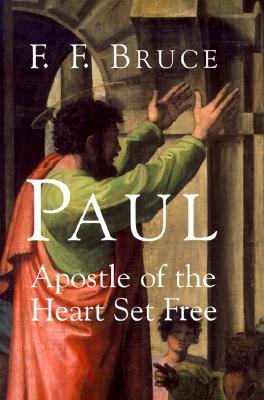Today I finished reading the entirety of Paul: Apostle of the Heart Set Free by F.F. Bruce. The title of the text in the U.K. is Paul: Apostle of the Free Spirit. The text is 510 pages in length, and it is a comprehensive exposition of all Paul’s letters and related writings of him within the apostolic era. F.F. Bruce (1910-1990) is a well-known Rylands Professor of Biblical Criticism and Exegesis at the University of Manchester, England. He wrote over forty commentaries and various other books, including The Acts of the Apostles, The Gospel of John, The Message of the New Testament, and A Mind for What Matters. Scholars, academics, students, and the pastorate throughout the world of believers in Christ recognize the author’s work as credible and of immense weight.
As Bruce walks through Paul’s books, he presents an in-depth look at the apostle himself as a way to get at the apostle’s character, heart, and mind to probe the tenacity and strength of his convictions. With grace and a divine imperative to accomplish just exactly what God appointed him to do. Luke, the author of the gospel Luke and the book of Acts, wrote of the trajectory of Paul’s remaining adult years after his conversion on the Damascus road. As Jesus Himself spoke of Paul’s commission: “for he is a chosen instrument of Mine, to bear My name before the Gentiles and kings and the sons of Israel; for I will show him how much he must suffer for My name’s sake” (Acts 9:15-16).
Paul was appointed the apostle to the Gentiles. And while he did suffer hardships, distress, and persecution, he took delight in that suffering for Christ. Paul boasted of all he survived as described by all his sufferings recorded in Scripture. Unlike anything that ever was or ever will be, the glory of Paul’s suffering was as an offering of love and eternal service of worship. Even for all of his labors and the churches he formed throughout Asia and Europe, by grace and the power of the Holy Spirit, he set the momentum and perpetual development of early Christianity that would span populations throughout the centuries.
As Paul moved about Ephesus and Troas, then to Philippi, Thessalonica, Berea, Corinth, Galatia, and along the Aegean coast, he was accompanied by various disciples and fellow workers. He worked by a church formation process that repeatedly involved synagogues wherever he went. The Gentile God-fearers, uncircumcised, and ethnic congregants among Jewish fellowships who attended synagogues were attracted to the gospel as made clear during Paul’s ministry. New converts of Christ met in homes and gathering places that did not conform to the requirements and traditions of Judaism or Greek temples. Consequently, in due time, Paul was ultimately imprisoned in Rome because of the deepening impact of his ministry throughout Greco-Roman culture because of social, political, and religious animosity. Isolated from nearly all associates, he was eventually executed after two years of house arrest during the reign of Nero, Emperor of Rome. Yet, throughout Mediterranean territories from the first century onward, the body of believers as a Church increased by size and geographical distribution.
Within F.F. Bruce’s book Paul: Apostle of the Free Spirit, there was a substantial range and depth covered around the historical background of Paul’s religious, political, ethnic, and cultural environments to set the stage of first-century developments, primarily characterized by social tensions, religious upheaval, and political strife since the death and resurrection of Christ Jesus. Numerous opposing cultural differences between Jewish, Roman, Greek, and Gentile peoples defined the social undercurrent of the Greco-Roman era. Paul’s kingdom work was through a diversity of enormous significance. Paul situated himself among people mixed with deeply rooted Hellenistic lifestyles and Judaic traditions reaching across languages, religious expression, traditions, social classes, and territorial pressures. By necessity, Bruce set up a detailed profile, with a historiologically substantiated context of Paul’s surroundings and occasion. To present to his readers what was to occur of enormous spiritual significance, Paul often hurriedly traveled, underwent beatings, survived shipwreck, experienced cold and hunger to reach Gentiles with the gospel. The fruit of his labors would last for thousands of years and reach millions.
As the reader progresses through the Bruce text, there is an intuitively chronological feel to the author’s exposition. First through the book of Romans, then the letters to the Corinthians, and all canonical letters thereafter written to the early churches. Namely, within Asia-minor and along the Aegean, including Anatolia, Crete, Cyprus, Macedonia, Acaiah, and Italy. However unlikely, there is speculation by some that he made it to Spain with the gospel as he wanted. The sequence of territorial progress along the chronological timeline of Paul’s work matches the narrative of the Bruce text. More specifically, apostolic instruction, training, discipline, and corrective efforts were iterative construction methods around the formation of lasting fellowships. Paul’s cyclical and pastoral letters were written and delivered to fellowships along a timeline across various corresponding churches that underwent growth pangs. The formative Church in numerous locations was guided by visitation and teaching according to each community’s maturity, unique needs, and cultural climate.
Paul’s written work as Scripture to the early Church was to pastor a people and shepherd them through a new covenant apart from the law, as sustained by grace, faith, and sanctification amid cultural treachery, false teaching, and interpersonal hostilities. He brought the gospel to people through outreach, and he discipled many. He planted Churches, and he set in order fellowships and assemblies of believers for sustained growth. He was especially known for his teachings (doctrines) of justification and sanctification as they accompany the work of the Holy Spirit through the gospel.
As F.F. Bruce meticulously traverses Paul’s letters, he illuminates apostolic revelation from divine inspiration around numerous subjects. Paul’s work and writings fully immerse the reader in undeniable foundational truths from the most profound theological topics to eschatological concerns and daily living by faith and obedience. Moreover, the author’s caliber, range, and volume of citations from scholars, patristics, and numerous primary and academic sources are entirely impressive. To such an extent, this labor of love from F.F. Bruce is a treasure of timeless analysis to bring out precisely the truth and meaning of the gospel for all who would believe. As appointed by Christ Jesus, Paul’s work served our LORD with all his heart, mind, soul, and strength. Paul suffered well.
















